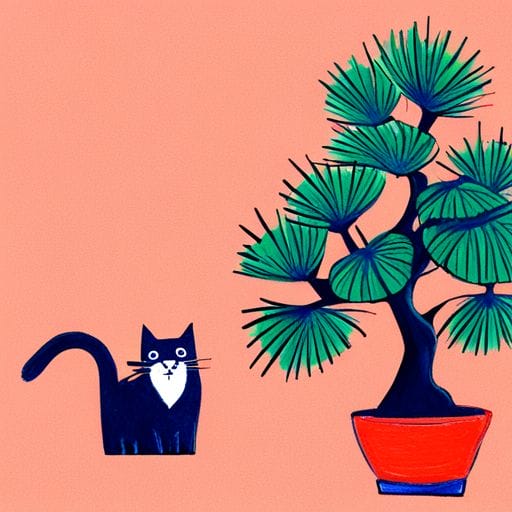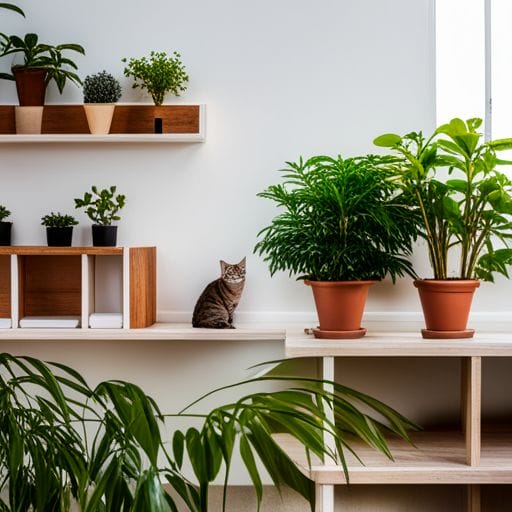Bonsai trees, known for their exquisite beauty and intricate designs, can pose a significant danger to our feline companions. While these miniature trees may seem harmless, they harbor a toxic nature that can have devastating consequences for cats.
Cats, being naturally curious creatures with a penchant for chewing on plants, are at risk of ingesting these toxic bonsai trees, which can lead to serious health issues and even death. It is crucial to identify the specific plant involved in order to provide the appropriate treatment if a cat is poisoned.
Some common poisonous bonsai trees for cats include Sago Palm, Chinese Rubber Plant, Fig, Azalea, and Plum. On the other hand, there are non-toxic bonsai tree options that are safe for cats, such as Prayer Plant, Juniper, Hibiscus, and Japanese Palm Tree.
To ensure the safety of our beloved feline friends, it is imperative to take precautions such as keeping bonsai trees out of their reach, using animal repellent sprays, creating physical barriers, and planting catnip as a distraction. When choosing plants for our homes, it is essential to prioritize the safety of our pets and children.
Contents
- 1 Quick Points
- 2 Dangers to Cats
- 3 Symptoms and Treatment
- 4 Safety Measures
- 5 Frequently Asked Questions
- 5.1 Can cats be trained to avoid chewing on bonsai trees?
- 5.2 Are there any bonsai trees that are safe for cats to be around?
- 5.3 How long does it take for symptoms of bonsai tree poisoning to appear in cats?
- 5.4 Are there any long-term effects on cats who have been poisoned by a bonsai tree?
- 5.5 Are there any natural remedies or home treatments for bonsai tree poisoning in cats?
Quick Points
- Bonsai trees can be toxic to cats, posing a risk of ingestion due to their curious nature and tendency to chew on plants.
- Common poisonous bonsai trees for cats include Sago Palm, Chinese Rubber Plant, Fig, Azalea, and Plum.
- Precautions should be taken to keep bonsai trees out of the reach of cats, such as using animal repellent sprays and creating physical barriers.
– Ingesting toxic bonsai trees can lead to vomiting, diarrhea, and general discomfort in cats, requiring veterinary assistance for treatment.
Dangers to Cats

Cats are at risk of poisoning and potential harm when exposed to certain types of bonsai trees due to their toxic properties. Bonsai trees, which are often irresistible to cats, can pose a serious threat to their health. Ingesting these plants can lead to various symptoms such as vomiting, diarrhea, and general discomfort. The toxins present in bonsai trees are harmless to humans but can be deadly for cats.
It is crucial to identify the specific plant if a cat is poisoned, as different types of toxic bonsai trees require different treatments. Some common poisonous bonsai trees for cats include Sago Palm, Chinese Rubber Plant, Fig, Azalea, and Plum.
To ensure the safety of cats, it is advisable to keep bonsai trees out of their reach, use animal repellent sprays, create physical barriers, and provide alternative distractions such as catnip. Considering the safety of pets and children is important when selecting plants for the home.
Learn More About Which Bonsai Trees Might Be Toxic To Your Cat
Symptoms and Treatment

Ingestion of certain plants can lead to various symptoms in animals and prompt medical intervention is crucial for appropriate treatment.
When a cat ingests a toxic bonsai tree, it can experience a range of symptoms, including vomiting, diarrhea, excessive drooling, difficulty breathing, tremors, and even seizures. These symptoms may vary depending on the specific plant and the amount ingested.
If a cat shows any signs of poisoning, it is important to seek veterinary assistance immediately.
Treatment for bonsai tree poisoning in cats may involve inducing vomiting, administering activated charcoal to absorb toxins, providing supportive care to manage symptoms, and, in severe cases, hospitalization for intensive treatment.
It is crucial to identify the specific plant involved in the poisoning to ensure the appropriate treatment is given.
Safety Measures

One important aspect to consider when keeping bonsai trees in a household with pets is implementing preventative measures to ensure the well-being of both pets and plants. Cats are known to chew on plants, and since most bonsai trees are poisonous to cats, it is crucial to take steps to keep them safe. Here are some safety measures that can be taken:
| Safety Measure | Description |
|---|---|
| Keep bonsai trees out of reach | Place the bonsai trees in areas that are inaccessible to cats, such as high shelves or hanging baskets. |
| Use animal repellent sprays | Spray a pet-safe repellent on the bonsai tree to deter cats from approaching or chewing on it. |
| Create physical barriers | Use fences, mesh covers, or plant cages to prevent cats from accessing the bonsai trees. |
| Plant catnip as a distraction | Grow catnip plants in a separate area to divert the cat’s attention away from the bonsai trees. |
By implementing these safety measures, pet owners can create a safe environment for both their beloved cats and cherished bonsai trees.
Frequently Asked Questions
Can cats be trained to avoid chewing on bonsai trees?
Cats cannot be trained to avoid chewing on bonsai trees. It is their natural instinct to explore and chew on plants. It is the responsibility of the owner to keep the trees out of reach and provide safe alternatives for the cat to satisfy its chewing instincts.
Are there any bonsai trees that are safe for cats to be around?
Yes, there are several bonsai trees that are safe for cats to be around. Some non-toxic bonsai trees that are safe for cats include Prayer Plant, Juniper, Hibiscus, Japanese Palm Tree, Christmas Cactus, Bamboo Palm, Peperomia Green, Money Tree, Parlour Balm, and Carmona.
How long does it take for symptoms of bonsai tree poisoning to appear in cats?
The symptoms of bonsai tree poisoning in cats can appear within a few hours to a few days after ingestion. It is important to monitor cats for vomiting, diarrhea, and other general symptoms and seek veterinary assistance immediately if poisoning is suspected.
Are there any long-term effects on cats who have been poisoned by a bonsai tree?
Long-term effects of bonsai tree poisoning in cats can vary depending on the specific plant and the severity of the poisoning. Potential effects may include organ damage, chronic illness, or even death. Immediate veterinary care is crucial to minimize long-term consequences.
Are there any natural remedies or home treatments for bonsai tree poisoning in cats?
There are no natural remedies or home treatments for bonsai tree poisoning in cats. It is crucial to contact a vet immediately if a cat is poisoned by a bonsai tree for appropriate medical treatment.



